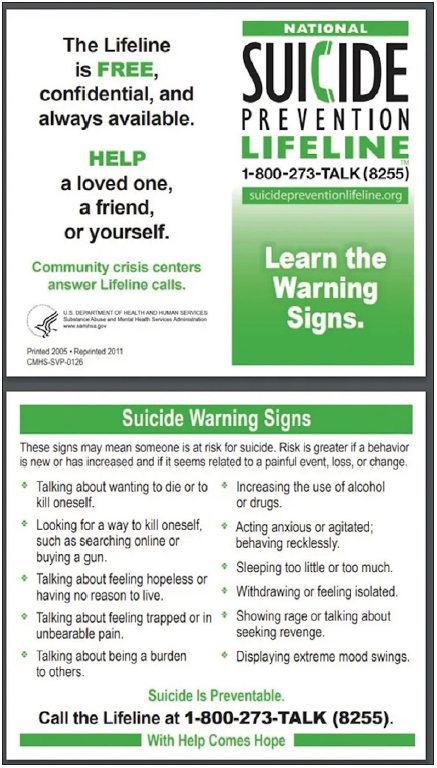most suicidal people show some signs that they are thinking about suicide. The signs may appear in conversations, through their actions, or in social media posts. If you observe one or more of these warning signs, especially if the behavior is new, has increased, or seems related to a painful event, loss, or change, step in or speak up.
What are the risk factors for teen suicide?
A teen might feel suicidal due to certain life circumstances such as:
Having a psychiatric disorder, such as depression, an anxiety disorder, bipolar disorder or oppositional defiant disorder
Family history of mood disorder, suicide or suicidal behavior
History of physical or sexual abuse or exposure to violence or bullying
A substance use disorder
Access to means, such as firearms or medications
Exposure to the suicide of a family member or friend
Loss of or conflict with close friends or family members
Physical or medical issues, such as changes related to puberty or a chronic illness
Being lesbian, gay, bisexual or any other sexual minority youth
Being adopted
Children who have attempted suicide in the past are also at greater risk.
In the U.S., suicide attempts are more common in adolescent girls than boys. But boys are more likely to die by suicide than are girls.
What are the warning signs that a teen might be suicidal?
Warning signs of teen suicide might include:
Talking or writing about suicide — for example, making statements such as “I’m going to kill myself,” or “I won’t be a problem for you much longer”
Withdrawing from social contact
Having mood swings
Increasing use of alcohol or drugs
Feeling trapped, hopeless or helpless about a situation
Changing normal routine, including eating or sleeping patterns
Doing risky or self-destructive things
Giving away belongings when there is no other logical explanation for why this is being done
Developing personality changes or being severely anxious or agitated when experiencing some of the warning signs listed above
What can you do to prevent teen suicide?
You can take steps to help protect your teen. For example:
Talk about mental health and suicide. Don’t wait for your teen to come to you.
Pay attention. Listen to what your child is saying and watch how he or she is acting. Never shrug off threats of suicide as teen melodrama.
Discourage isolation. Encourage your teen to spend time with supportive friends and family.
Monitor and talk about social media use. While social media can give teens valuable support, it can also expose them to bullying, rumor spreading, unrealistic views of other people’s lives and peer pressure.
Encourage a healthy lifestyle. Help your teen eat well, exercise and get regular sleep.
Support the treatment plan. If your teen is undergoing treatment for suicidal behavior, remind him or her that it might take time to feel better. Help your teen follow his or her doctor’s recommendations. Also, encourage your teen to participate in activities that will help him or her rebuild confidence.
Monitor medications. Though it’s uncommon, some teens might have an increase in suicidal thoughts or behavior when taking antidepressants, especially in the first few weeks after starting or when a dose is changed. But antidepressants are more likely to reduce suicide risk in the long run by improving mood. If your teen has suicidal thoughts while taking an antidepressant, immediately contact the doctor or get emergency help.
Safely store firearms, alcohol and medications. Access to means can play a role if a teen is already suicidal.
If you’re worried about your teen, talk to him or her and seek help right away.
If any of these signs are present, call the National Suicide Prevention Lifeline at 1-800-273-8255.
Talking about death or suicide
Seeking methods for self harm, such as searching online or obtaining a gun
Talking about feeling hopeless or having no reason to live
Warning Signs of Suicide in Adults
The following warning signs may be present in adults who have a high risk for suicide:
Depression or other mental health condition, such as severe anxiety, bipolar disorder (manic-depressive illness), or schizophrenia
Depression followed by sudden cheerfulness and contentment, which may mean the person has made a decision to finalize a suicide plan
A previous suicide attempt
Substance use disorder
Preoccupation with death in conversations
Giving away personal possessions
Factors that may increase the risk of suicide include having:
A family member who has died by suicide.
A family history of depression, bipolar disorder, or schizophrenia.
A history of physical or sexual abuse.
Diagnosis of a serious medical illness.
Failing relationships.
A divorce.
A recent life change, such as a death of a spouse or other member of the family, marriage, break-up of a marriage, the birth of a child, a job loss, a job promotion or demotion, or legal problems.
The U.S. Food and Drug Administration (FDA) has issued an advisory on antidepressant medicines and the risk of suicide. Talk to your doctor about these possible side effects and the warning signs of suicide.
Sources:
https://www.cigna.com/individuals-families/health-wellness/hw/medical-topics/warning-signs-of-suicide-in-adults-aa45567
Exclusive content from CARE magazine









